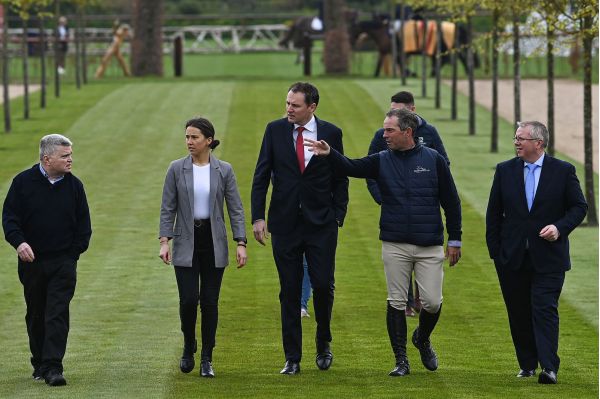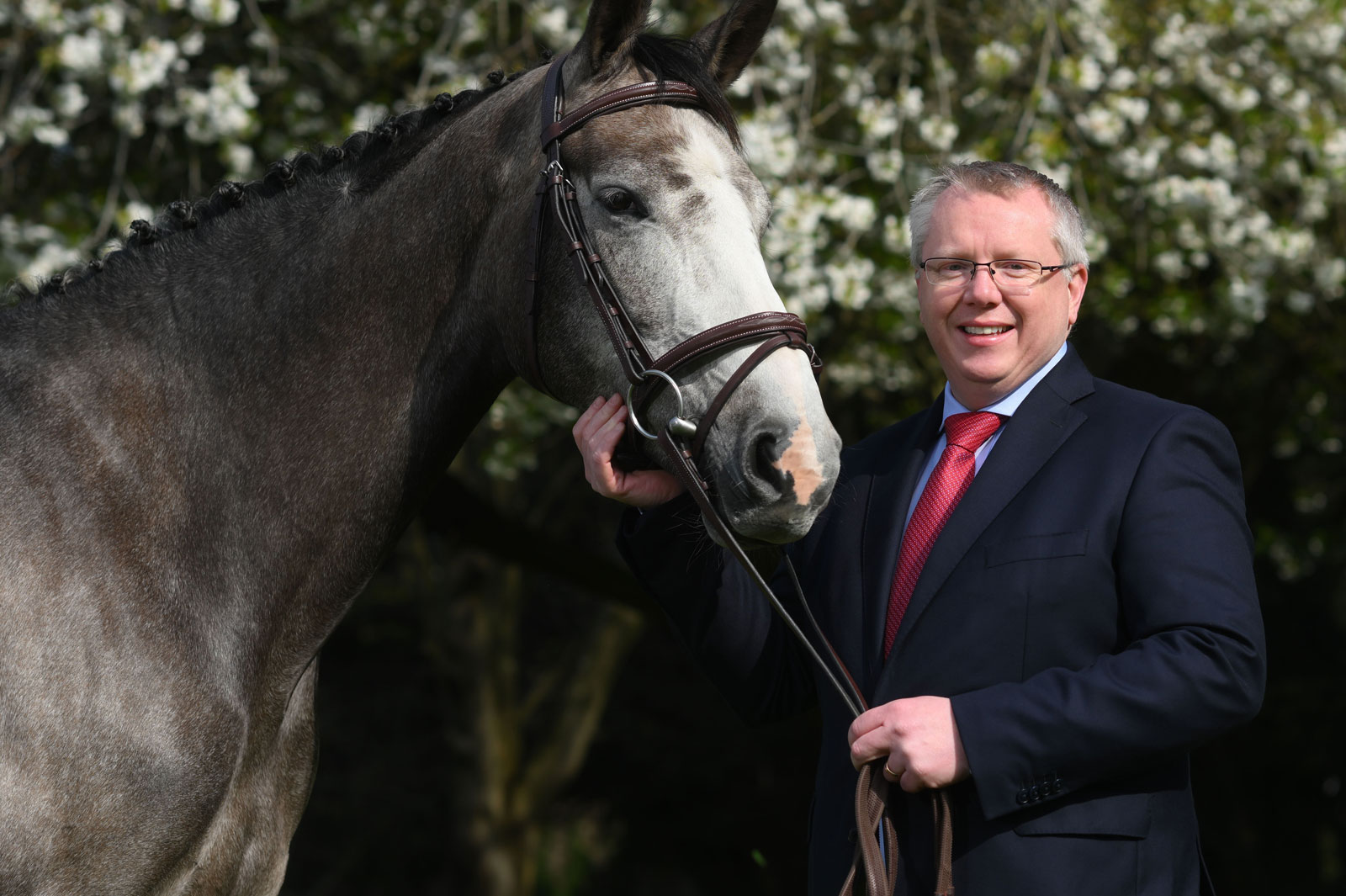Under the spotlight

The recent RTÉ Investigates exposé into horse-welfare issues and traceability in the food chain has garnered widespread condemnation; while the upcoming Olympics Games in Paris will celebrate Ireland’s leading position within the horse sport arena.
Denis is keen to address the former issue: “The single biggest challenge for the industry as a whole right now is our social license, which has been compounded by the recent RTÉ investigation. First and foremost, I want to state that we unequivocally condemn the practices that were witnessed – it was absolutely abhorrent – and I want to compliment the investigation and the work Conor Ryan and his team did at RTÉ. We are very aware that horses hold a special place in the collective heart of the Irish people – there is a love and fascination of horses in Ireland. When I witnessed the abuse evident in this programme, both from a welfare and a traceability point of view, I was shocked: it has absolutely no place in the industry or sport. The activity we saw here was illegal,” he said.
"Social license is the tacit support and acceptance an industry receives from society as a whole. In Horse Sport Ireland, we are very conscious of the impact that loss of that social license to operate could potentially have on our sport and industry. At an international level, the International Federation for Equestrian Sports (FEI) commissioned an Ethics and Welfare report in 2023 and in the last month the FEI announced that it was putting over €1m into supporting an action plan on ethics and welfare within the equine sports industry. This is key as there is an existential threat here – it is suggested that some sports could potentially be removed from the Olympics in Los Angeles (2028) or Brisbane (2032) and it would be catastrophic if this happened to the equine sector. That would be a huge economic threat to breeders and producers here, and to ‘Ireland Inc.’ The equine sports industry contributes over a €1.5bn to the Irish economy and employs over 20,000 people. So, we need to tackle this challenge at a national, European, and global level."
Sustainable efforts
The second big challenge currently facing the equine industry, Denis says, is one that every sector is tackling: climate action. “Sustainability and climate change are two areas that every industry needs to address. I was very aware of this coming into my role here, having been with Macra previously. This was a huge topic for us at Macra and I was surprised two years ago that it wasn’t being spoken about more in equine at the time. But it is a priority. The horse is very economical with grassland as well, so we have a very positive environmental and climate story to tell.
Horse Sport Ireland has worked with the British Equestrian Federation and environmental specialists, White Griffin, to undertake a research project into the risks, challenges and opportunities of environmental sustainability in equestrianism, equine breeding, and equine sport, and we launched this research last year at the RDS Dublin Horse Show. This has created a baseline regarding where the industry is at from an environmental perspective. Riding centres and training yards are actually making strides on daily basis, be it across biodiversity measures or water or grassland management, which is great to see. Over the course of the summer of 2022, we organised a number of equine farm walks where the topics of grassland management and sustainability were to the fore.
And we have some great stories to tell across our sustainability efforts, from rainwater harvesting at a Tipperary Equine Centre to the fantastic sustainability measures that Festina Lente are undertaking in terms of their programmes at their therapeutic riding centre.”

Denis Duggan, CEO, Horse Sport Ireland, with Irish sport horse, Danos Lola, during the Studbook Series Launch 2022 at the National Horse Sport Arena. Photo: Stephen McCarthy/Sportsfile.
Challenge to opportunity
These challenges outlined above by Denis also present huge opportunities, he says: “If we tackle these challenges then we will tap into a lot of opportunity and success for the industry. And, if we look at our British counterparts for example, our sector is much more embedded with the agriculture sector, which brings a lot of benefits. For example, access to funding through the Department of Agriculture, Food and the Marine (DAFM) has been key. The inclusion last year of equine measures within the Targeted Agricultural Modernisation Scheme (TAMS) scheme was a great win. This is not available in Northern Ireland or the UK. We were very strong in our lobbying here; and we worked with Ifac on quantifying scale of demand in order to publish a report called The Business of Breeding 2022, which was influential as regards identifying the business need. It was the result of a collective action of all stakeholders, and we are very grateful to the DAFM for the funding. Another significant piece of funding – particularly for rare breeds such as the Connemara pony and the Irish Draught horse – is that those who are eligible to apply for Agri-Climate Rural Environment Scheme (ACRES) can now apply for an additional top-up payment for that rare breed if registered in the relevant stud book.”
Olympic hopes
With the Olympic Games around the corner, Denis is looking forward to attending in his capacity as CEO of HSI: “This will be my first Olympics in this role – the last time I attended the Olympics was in Sydney in 2000 as a spectator. We are absolutely fortunate to be living through a golden era of equestrian sport. In the last two to three years we have climbed the world ranking in show jumping and we are now world number one. From a team momentum perspective this is a great place to be. Our athletes compete with athletes of other nations all over the world regularly – that has been a part of Michael Blake’s approach (the Chef d’Equipe for Ireland) – and so we are strong, and we are used to winning. Not being on that podium has become a rarity. We are fortunate that we qualified in both eventing and jumping on our first opportunity at the FEI World Championships in 2022 so that has been great in terms of planning and investing for Paris. We have teams qualified in showjumping and eventing and one individual athlete qualified in dressage. We will be announcing our nominated para-equestrian athletes in the coming weeks who will compete in the Paralympics in September. And, we have four Irish-bred horses in the teams as well (two Irish Sport Horses in the jumping team – James Kann Cruise and Pacino Amiro – and one Irish Sport Horse, and one other Irish-bred horse in the eventing team – Action Lady M and Colorado Blue respectively), which is fantastic from an Irish breeding point of view.”
New online passports
Denis said that he is excited to see a new online passport system launch in early July. “We have undertaken a huge transformation project to modernise our IT system for processing passports online which will be a big benefit to the industry. Not only will it help towards improving security, which is crucial in light of the RTÉ investigation, but it will also make it more efficient for those breeders applying. We are in the final stages of testing, and it will be up and running for a soft launch in the coming weeks. We hope to see a turnaround of processing happen between 20-40 days (as opposed to eight to 10 weeks); however the postal system will still exist for those who want to use it.”





